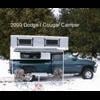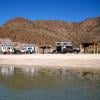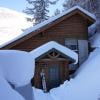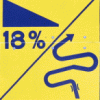Four Wheel Eagle vs Northstar MC600
#11

Posted 05 May 2007 - 07:12 PM
Translation. The camper is too heavy for a small truck. If you beef up the suspension enough to handle the weight, you will see other problems appear with the truck over time.
Wood frame campers don't condensate like the aluminum frame ones.
Translation: All campers have condensation. Doesn't matter if they are wood or aluminum frame. Problem is that when a wood frame gets condensation in it, the wood tends to soak it up. Over time this rots the wood. Staples, glue and screws start to come loose and you have to fix something. With the aluminum frame the condensation eventually evaporates out and the frame is still in great shape. That is why you see the FWC campers and ours that keep going and going and going and going. (picture a bunny beating drum here) A good example is just to go out and look at some wood frame campers that are about 7 years or older that have really been used and not just stored in the garage. See the shape that they are in and the price's that people are asking for them.
These are the two biggest sales pitches that I think should be outlawed.
Even with that out though, they make a good camper. Just depends on what you want to put it on and how long you plan to use it for. Then consider the resale value that you will get for the camper if you decide on it and if you will be happy with that considering the cost of your use of the camper.
Try to fit a camper to your truck that will not overload the truck. Carrying too much weight on a truck causes front end problems in the long run and suspension problems. It can also lead to prower train problems down the road depending on the load and how it is driven.
Not trying to convince you against a wood frame camper here either. Just trying to point out the advantages and disadvantages of the campers. We all have our pro's and con's.
The campers like the Northstar offer a lot of creature comforts that the lighter ones don't. FWC offers a lot of options that we don't. Just a matter of what level of comfort that you are looking for when you do go on your trips.
#12

Posted 06 May 2007 - 02:42 PM
I agree the weight issue is huge, the northstar dry weight alone takes up almost all of a small truck load capacity and these are not just suspension and drive train issues, also brakes and frame to mention a couple. Truck camper manufacturing must be pretty unregulated otherwise marketing of campers exceeding weight capacity of the trucks they are marketed for might be more limited.
Regarding condensation I think the other camper salesman have a point. Aluminum conducts heat incredibly well which is one reason it is so hard to weld - the heat during welding is conducted away from the weld site so even though the melting point of aluminum is much lower that steel it takes higher energy welding equipment to weld. Cold from the outside is conducted to the inside of the camper on the exposed uncoated aluminum and naturally moisture condenses. In my homemade rig the only condensation that occurs is in the glass side windows and the aluminum framing of the roof - I made my front window and door window from polycarbonate and I don‘t recall condensation on them (glass is a better heat conductor than polycarbonate). I wonder if you had the aluminum framing vinyl or plastic-coated after welding if that would help reduce condensation. Just a thought and probably doesn’t make logistic or $ sense, but it seems like some structural (bed floor rot) and comfort issues are mostly from condensation.
PS
Have you ever thought of making a bed rail camper based on your regular camper, it would be even lighter and the truck could be used as a regular truck like with a cap without removing the camper. It would likely have a very limited market as I see most campers like the amenities of your regular camper.
#13

Posted 06 May 2007 - 03:49 PM
I'd like to just address the weight issues. Its been my experience that typically the weight carring capacity of all trucks is over rated by the manufacturer. But it especially overated in small trucks.
On my T-100 and my Frontiere with the heavier camper the truck could barely get out of its own way. On rough roads the camper tried to beat itself and the truck to death. And thats on a truck that Toyota rated higher than an F150.
Oddly enough the passenger (wife) never notices the truck lugging but it drove me crazy. I added overloads on the T-100 and it helped but it rode like a dump truck with the camper off. And if your in the hills and its an auto trans forget about over drive. The trans will just keep shiftng up and down constantly. Dont forget to add a tranny cooler.
Jay
#14

Posted 06 May 2007 - 04:13 PM
Regarding plastic coating the aluminum to reduce condensation - maybe that wouldn't help anyway but you could try a spray on liner like Rhino and do that as a side business. Maybe we will be seeing BenBurnett inc. listed on the NYSA soon.
#15

Posted 06 May 2007 - 05:04 PM
Actually over the years, the improvements that we have made with the camper have reduced the condensation problem considerably. For all the years that I used a FWC in cold weather, I never had a condensation build up in the camper. Of course I always had a heater also. I try to explain that to people in cold climates as well.
You are right that the aluminum condensates more than the wood, but all campers do have condensation in the walls depending on weather conditions that you are in and the temperature of the interior of the camper. I have torn apart too many wood frame campers over the years to say that they don't have problems in the long run. A lot has to do with how they are stored also and taken care of.
Bottom line is that any camper that is neglected will have problems and one that is taken care of and stored correctly will last a lot longer.
#16

Posted 07 May 2007 - 03:00 AM
See http://www.warmlite.com/vb.htm
The heavy condensation inside the camper after a cold night results from your body loosing moisture. The solution is supposed to be a vapor barrier close to the body. Perhaps readers have experimented with this idea. I have not. However, condensation from sleeping in a camper, tent, or what have you, is likely to be considerable when sleeping with no heat. I would very much appreciate comments from those who have tried the vapor barrier techniques.
In our old wooden framed hard shell camper, we hung a quilt over a curtain rod on the overhead to close off the sleeping area over the cab. This made a small space our body warmth turned into a cozy little nook. We would open a window for a bit of fresh air through the night.
We are ordering some oversize drapes for the FWC which should make the camper a bit warmer and should result in the furnace running less. I suspect what actually happens is the bedding and curtains absorb moisture from the breath and bodies of the sleeping occupants and the moisture evaporates if the humidity is low and the air is above freezing the next day. I think the quilt we hung up in our old hard side camper absorbed moisture and dried out the next day, or when we got home.
This moisture problem is supposed to be particularly bad with goose down bedding that is used for many days with no way to properly dry it. After thinking about the problem a bit, I believe the best way to stop moisture problems in a camper is with Ben’s suggestion to use the furnace. Set it on 50 degrees when it is time to go to bed.
#17

Posted 07 May 2007 - 03:58 AM
My buddy in West Oz just bought a new north star over there..let me tell you they are not cheap! $26,000 for a loaded one:confused:
#19

Posted 08 May 2007 - 12:29 AM
Weight is probably the biggest difference that you will find. For lightweight and quality of construction, there are really only two choices out there, FWC and ourselves.
Weight is the reason I went with a FWC. When fully loaded (full tank of gas, water, propane, food, me and the family) I am within a few hundred pounds of the GVWR of my full size Dodge 1/2 ton truck - I know because my company has a truck scale. I have been looking at 3/4 ton new and used trucks, but given the expense, have decided to stick with what I have unless a great deal comes along.
I also need 4x4 to reach some of my preferred sights and I would be afraid of what might happen to a lesser camper.
#20

Posted 18 August 2007 - 11:05 PM
Sorry to bring up this old post.We are ordering some oversize drapes for the FWC which should make the camper a bit warmer and should result in the furnace running less.
What do you mean by "oversize drapes"... size? thickness?
Can you please provide some more details as I am tweaking my camper order.
THANKS,
Mike
'08 ATC Cougar (built 06/16/08)
# of nights in camper: '08=15, '12=21,'13=16, '14=10, '15=52, '16=11, '17=20 (equals 145)
0 user(s) are reading this topic
0 members, 0 guests, 0 anonymous users





















